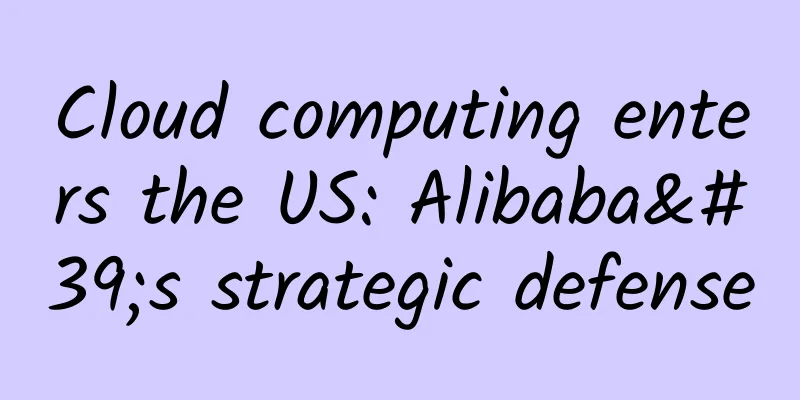Cloud computing enters the US: Alibaba's strategic defense

|
Following Hangzhou, Qingdao, Beijing, Hong Kong, and Shenzhen, Alibaba Cloud recently announced that its first data center in North America has been put into trial operation, providing cloud computing services to users in North America and around the world. In this regard, some commentators believe that Alibaba's move is the real challenge to Amazon and the beginning of its efforts in cloud computing. After all, the United States is the home of today's cloud computing giants such as Amazon, Google, and Microsoft. But is the truth really that simple? According to Yu Sicheng, the vice president in charge of Alibaba Cloud's international business, the original intention of setting up a US data center is to provide convenience to users. That is, for a large number of Chinese companies that want to expand their North American business, through the Alibaba Cloud official website, with a few clicks of the mouse, they can deploy websites and mobile applications located in the United States in China. Previously, these companies needed to rent and deploy servers overseas, facing various inconveniences such as language, local laws and policies, and currency exchange. It mainly includes five cloud services, including cloud server ECS, load balancing SLB, relational database service RDS, cloud shield, and cloud monitoring. In contrast, in 2013, Amazon's AWS could already provide 280 new functions and services; in 2014, it reached 450. In addition, from Gartner's magic quadrant on cloud computing competitiveness, Amazon ranks first. It can be seen that Alibaba Cloud's opening of US data center operations does not mean a direct challenge to Amazon. After all, the gap between the two is too large. Coincidentally, around the time when Alibaba Cloud announced the opening of its U.S. data center operations, IDC released the China Public Cloud Services Tracker, 2014H1, which showed that Alibaba Cloud topped the IaaS service market for the first time with a market share of 22.8%, while Amazon, which entered China in 2013, ranked fifth. In just over half a year, Amazon was able to enter the top five in China's public cloud service market, which shows Amazon's brand influence and technical strength in the cloud computing service market, and also reflects from one side that Alibaba Cloud faces considerable competitive pressure even in the local market. Another point that cannot be ignored is that with the trend of combining IaaS with general PaaS in cloud computing, the advantage of Alibaba Cloud IaaS over its competitors will be weakened, and its profits will continue to decline. As for PaaS, as mentioned at the beginning of this article, it is Alibaba Cloud's shortcoming. It seems more reliable to explain Alibaba Cloud's entry into the US market by easing Amazon's (including Microsoft) offensive in the Chinese cloud computing market. Although it may not grab much actual market share in the US market, it is also a concern for competitors to provide cloud services in their home turf. In addition, since Alibaba went public, the exposure of counterfeit goods, fake orders and other issues have directly affected investors' trust in Alibaba and their concerns about Alibaba's prospects. This can be seen from the recent plunge in Alibaba's stock price and its subsidiary Tmall's announcement of the adjustment of the 2015 investment standards, which ended the method of merchants entering the platform on their own and invited merchants and brands to enter the platform through targeted consumer and market demand. In contrast, cloud computing is the best capital theme at the moment. Not only Amazon, but also Microsoft, Google, IBM, etc. are using it to boost stock prices and attract the attention of the capital market. In particular, there have been rumors since last year that Amazon is likely to spin off its AWS cloud computing business, which has made Alibaba realize the importance of the cloud computing market to its image change in the eyes of American investors. In addition, given that Amazon AWS's competitive method of low-price loss-making enclosure has always been recognized by the industry, once AWS is really spun off from Amazon, its subsequent momentum to attack the cloud computing market (including the Chinese market) will inevitably increase, which will undoubtedly put more pressure on Alibaba Cloud's future base in the Chinese cloud computing market. Although Alibaba Cloud currently contributes very little to Alibaba's overall revenue and profits, Jack Ma mentioned Alibaba Cloud Computing in his recently published book, The True Story of Alibaba. He believes that Alibaba's biggest strength is cloud computing, and compared to Google, which is better in this area, Alibaba Cloud Computing has the advantage of being open. "Although Amazon is open, its technology is not as good as ours, and Google's technology is worse than ours, but its openness is not as good as ours." Now that this has been said, it's better to show the horse and the mule to the home turf of American cloud computing. To sum up, we believe that Alibaba Cloud's choice to open its U.S. data center (to conduct cloud computing business in the U.S.) at this time is not a challenge to Amazon as the industry claims, but more of a helpless strategic defense, namely to ease the pressure from domestic cloud computing market competitors, while partially correcting Alibaba's image that has been increasingly questioned in the minds of U.S. investors. As for obtaining considerable real money and position, it is still a long way off. As a winner of Toutiao's Qingyun Plan and Baijiahao's Bai+ Plan, the 2019 Baidu Digital Author of the Year, the Baijiahao's Most Popular Author in the Technology Field, the 2019 Sogou Technology and Culture Author, and the 2021 Baijiahao Quarterly Influential Creator, he has won many awards, including the 2013 Sohu Best Industry Media Person, the 2015 China New Media Entrepreneurship Competition Beijing Third Place, the 2015 Guangmang Experience Award, the 2015 China New Media Entrepreneurship Competition Finals Third Place, and the 2018 Baidu Dynamic Annual Powerful Celebrity. |
<<: How is the development of ultra-high-definition broadcasting abroad?
>>: How much do you know about patents related to driverless cars?
Recommend
In 2020, new marketing innovation breakthrough!
First, I would like to talk about the two dimensi...
Example analysis: How does Love Bank APP achieve user fission?
The user fission of Love Bank is very ingenious. ...
The rules of selling goods through short video live streaming!
In my experience of creating short videos to prom...
In just two months, iPhone X accounts for 35% of the entire mobile phone industry's profits
According to the fourth quarter 2017 research rep...
APP promotion: building user levels from 0 to 1
A useful or interesting APP user rating system ca...
Operational addition and subtraction that you must know
This year, a large part of my work focus has been...
If a giant planet hits the Earth in 100 years, where will humanity go?
The probability of this assumption is extremely s...
How can educational institutions leverage WeChat for Business to seize the dividends of private domain traffic?
When it comes to the Internet tool with the large...
When I check the source code of a web page, it is all garbled, but the page displays normally. What's going on?
When I check the source code of a web page, it is...
A country has legalized marijuana! Auditory hallucinations, intellectual disabilities...soft drugs are no joke!
Experts in this article: Hu Houxiang, Chief Physi...
How much does it cost to join the Xiantao Fresh Food Mini Program?
How much does it cost to join the Xiantao Fresh F...
Comprehensive analysis of how the treasure hunting platform conducts "category operation"
Operations generally consist of content operation...
A self-media from 0 to 1: How to operate a Toutiao account?
1. Have a clear and measurable goal We all like t...
Six close encounters with Jupiter reveal the mystery of the Great Red Spot that has existed for more than 350 years
On a clear night, you can often see a very bright...
Private domain traffic operation of Midas Touch Enterprise Account
Brief introduction to the private domain traffic ...









